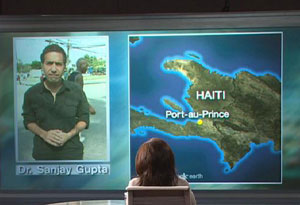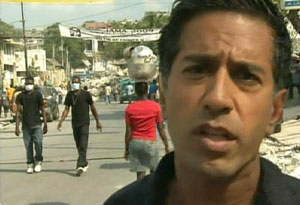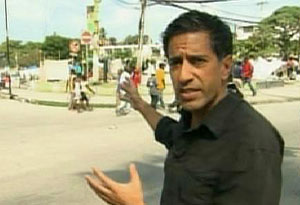Dr. Sanjay Gupta Reports from Haiti

Photo: CNN Chief Medical Correspondent Sanjay Gupta
On January 13, 2010, one day after a devastating earthquake destroyed Haiti's largest city and left an estimated 200,000 people dead, CNN's chief medical correspondent Dr. Sanjay Gupta arrived on the scene.
This trained neurosurgeon filed some of the first reports out of Port-au-Prince, Haiti, the epicenter of the destruction, and helped treat injured men, women and children. After hospitals were reduced to rubble, he found patients wandering the streets, looking for medical assistance.
One person begged Dr. Gupta to examine a 15-day-old baby girl who suffered a head injury during the earthquake. Thankfully, her skull was not fractured. Dr. Gupta bandaged her head laceration and moved on to help others in need.
Then, while helping out at a field hospital, Dr. Gupta says reports of violence caused Belgian doctors to evacuate. Dr. Gupta, the only doctor left behind, and his crew stayed to care for 25 critically injured patients.
On the morning of January 20, 2010, Dr. Gupta joins Oprah live via satellite…just hours after a 6.1 aftershock rattled Haiti's shaky structures and spread fear among survivors. "People have obviously been displaced from their homes, but also to your point, people are just fearful to go back inside a structure because of these aftershocks," Dr. Gupta says. "It's hard to describe the emotional anxiety."
This trained neurosurgeon filed some of the first reports out of Port-au-Prince, Haiti, the epicenter of the destruction, and helped treat injured men, women and children. After hospitals were reduced to rubble, he found patients wandering the streets, looking for medical assistance.
One person begged Dr. Gupta to examine a 15-day-old baby girl who suffered a head injury during the earthquake. Thankfully, her skull was not fractured. Dr. Gupta bandaged her head laceration and moved on to help others in need.
Then, while helping out at a field hospital, Dr. Gupta says reports of violence caused Belgian doctors to evacuate. Dr. Gupta, the only doctor left behind, and his crew stayed to care for 25 critically injured patients.
On the morning of January 20, 2010, Dr. Gupta joins Oprah live via satellite…just hours after a 6.1 aftershock rattled Haiti's shaky structures and spread fear among survivors. "People have obviously been displaced from their homes, but also to your point, people are just fearful to go back inside a structure because of these aftershocks," Dr. Gupta says. "It's hard to describe the emotional anxiety."

Aftershocks aren't the biggest problem facing Haiti. Dr. Gupta says this island nation is facing a medical crisis that, with the proper distribution of doctors and supplies, is preventable.
"Obviously, at the time of the initial earthquake, a lot of people died. We know that now. What is sort of important for people to realize is that a lot of people lived, as well, but barely. They have traumatic injuries, and they are dying," he says. "They're just not getting the care that they need."
Dr. Gupta says no one should die because they suffered a crushed limb or infection. "They have what are called 'preventable deaths' in the medical world," he says. "It's something that, in most hospitals around the world, could be taken care of pretty easily, but instead, they're walking the streets. They're slowly going into kidney failure. They're having heart problems."
"Obviously, at the time of the initial earthquake, a lot of people died. We know that now. What is sort of important for people to realize is that a lot of people lived, as well, but barely. They have traumatic injuries, and they are dying," he says. "They're just not getting the care that they need."
Dr. Gupta says no one should die because they suffered a crushed limb or infection. "They have what are called 'preventable deaths' in the medical world," he says. "It's something that, in most hospitals around the world, could be taken care of pretty easily, but instead, they're walking the streets. They're slowly going into kidney failure. They're having heart problems."

To get medicine and basic necessities to those who need it most, Dr. Gupta says Haiti has to put someone in charge of supply distribution. "It's somewhat appalling, actually, because so many of these supplies I'm talking about are at the airports," he says. "They've gotten into Port-au-Prince, but they're not getting distributed to places like this where it's needed most."
Dr. Gupta says there are Haitian citizens on the ground who know what's happened and where the need is greatest, but instead of gathering vital information and focusing on lifesaving efforts, security has become the top priority.
"Unless you save people's lives, unless you get them some care, the security's not going to matter," Dr. Gupta says. "And, by the way, if you increase the access to medical care, they're going to decrease security concerns. People are desperate. That's why these security concerns go up."
Dr. Gupta says there are Haitian citizens on the ground who know what's happened and where the need is greatest, but instead of gathering vital information and focusing on lifesaving efforts, security has become the top priority.
"Unless you save people's lives, unless you get them some care, the security's not going to matter," Dr. Gupta says. "And, by the way, if you increase the access to medical care, they're going to decrease security concerns. People are desperate. That's why these security concerns go up."

There have been many deadly natural disasters in recent years, including the East Asian tsunami and Hurricane Katrina, but Dr. Gupta says he's never seen anything like what's happening in Haiti.
Dr. Gupta says this crisis worries him more than all the others. "You've got to think about where Haiti started," he says. "This is a country that's, as you know, one of the most impoverished in this part of the world. But as a reflection of that, the medical infrastructure was terrible. [It was] really nonexistent in so many places. It has one of the worst physician-to-patient ratios anywhere in the world. That was the starting point eight days ago."
Now, with a sudden decrease in number of hospitals and medical personnel and an increase in the number of patients, Dr. Gupta says it's hard to imagine how Haiti will ever catch up. "With the tsunami, people either lived or they died. People who lived, they needed basic supplies like food and water, but for the most part, they weren't injured," he says. "People here lived, but they live with catastrophic injuries, and they need that care."
How you can help in Haiti
What Wyclef Jean saw in Haiti
Dr. Gupta says this crisis worries him more than all the others. "You've got to think about where Haiti started," he says. "This is a country that's, as you know, one of the most impoverished in this part of the world. But as a reflection of that, the medical infrastructure was terrible. [It was] really nonexistent in so many places. It has one of the worst physician-to-patient ratios anywhere in the world. That was the starting point eight days ago."
Now, with a sudden decrease in number of hospitals and medical personnel and an increase in the number of patients, Dr. Gupta says it's hard to imagine how Haiti will ever catch up. "With the tsunami, people either lived or they died. People who lived, they needed basic supplies like food and water, but for the most part, they weren't injured," he says. "People here lived, but they live with catastrophic injuries, and they need that care."
How you can help in Haiti
What Wyclef Jean saw in Haiti



